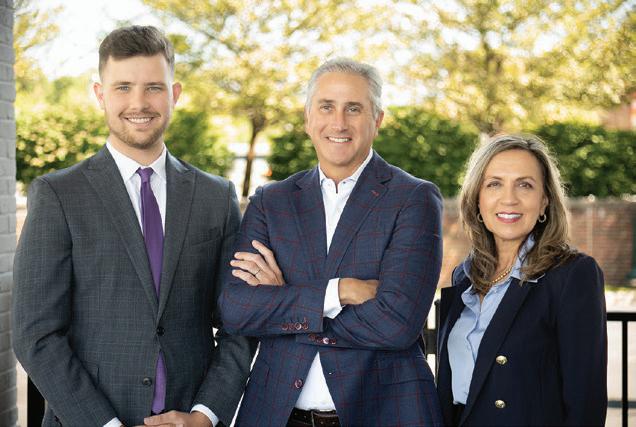THE LAST PUSH
Financial experts say the final years before retirement are crucial, but preparations should start long before. Here are some common missteps to avoid as you look toward a post-work life.
By Andrew King
As the majority of Americans live paycheck to paycheck, one challenge looms in the distance, and it may be closer than you think: Preparing for retirement.
The principles that guide smart retirement in 2024 aren’t necessarily the same as they were 20 years ago. So for many approaching retirement age, the final stretch before calling it quits can come with a variety of surprises, along with regret for not having adjusted plans sooner.
And to make matters even more challenging, many simply aren’t aware of what they should be doing, when they should be doing it, or how far behind they may actually be.
“Most people don’t know how it works, and they don’t take the time to learn,” says Peyman Salehi, managing director and head of wealth and asset management for Fifth Third Bank in Central Ohio.
For those who are playing catchup as retirement nears, here are a few key areas where Central Ohio financial advisers often see mistakes being made.
Unrealistic Expectations
Retirement is meant to be a season of following passions and enjoying time previously spent working. But that expectation can result in lofty, idealistic goals rather than a pragmatic plan to live into your senior years.
“Many retirees have a very clichéd view of what retirement is—they’re going to travel a bunch, take an RV across the country, things of that nature,” says Derek Sears, director

of wealth management and financial resources at KEMBA Financial Credit Union. “But what I find is that you ask follow-up questions, like, ‘Do you travel now?’ or ‘Have you ever been in an RV?’ and the chances of you retiring one day and executing on those are actually really low.”
Shawn Ballinger, founder and wealth manager at Columbus Street Financial Planning, says the disconnect between those goals and concrete retirement plans can come from a variety of places. But one of the consistent areas where people underestimate retirement spending is in planning for expenses related to health care.
Ballinger often recommends that people put much more in their health savings accounts than they expect to need, advising clients to set aside up to $150,000 or even $200,000 to account for unexpected health costs. And for those with dreams of a major post-retirement lifestyle shift, his biggest advice is to simply try it on for size before you’re there.
“If you think you can live on $100,000 a year, as an example, well then maybe you might want to try that for two, three, four or five years before retirement to see if you can actually stick with that,” he says. “The old retirement of sitting in the rocker and watching country-westerns? That doesn’t exist like it did 30 years ago.”
Too Much Risk Aversion
It’s a simple idea: When your income is fixed, your investments should be
as safe and risk-averse as possible, right? According to the experts, not always—especially if you’re retiring on the earlier side.
“People think their portfolio should become more conservative as they get closer to retirement, and while that’s true around the margins, the reality is that we’re all living longer,” Ballinger says. “I basically project all my clients are going to live to be 95. … And if that’s the case, then the portfolio still has to have enough risk to meet those longterm planning goals.”
Risk aversion can take a variety of forms, from the percentage of a portfolio—Ballinger says he advises 60 percent stock risk or higher for many clients—to decisions to sell assets and investments. Often, clients who have held on to a particular investment are reluctant to sell. Others avoid diversifying with stocks based outside of the U.S. because of recency bias. In reality, those on a fixed income need to be able to generate as much as they can.
And although the last decade before retirement is crucial for planning purposes, Salehi says excessive risk aversion can start to have an impact much earlier in the process.
“Sometimes they invest too conservatively very, very early on, which does not allow them to accumulate the assets [they need], partly because of lack of understanding, fear or anxiety,” he says. “But the beauty of the public markets is that time cures most ailments. So time is really important, and people need to go back to the inception
point and really concentrate on getting the most out of those 401(k)s and going a lot more aggressive in the early stages, when time is on their side, to be able to accumulate as much wealth as possible.”
Late and Lenient Budgets

Peyman Salehi, managing director and head of wealth and asset management for Fifth Third Bank in Central Ohio
When most people talk about retirement planning, they’re thinking about people in their 40s, 50s and 60s. But the experts say consideration should begin a lot earlier than your last 10 years before retirement, or even your last 20 years.
“If you’re going to retire at 60, you worked for 40 years and you’ll be retired for almost that period of time,” Sears says. “So not having saved enough for that and not having a well-managed budget can put you in a really bad position.”
Although nearly everyone knows it’s a good idea, advisers say you may

adviser Shawn Ballinger of Columbus Street Financial Planning

Sears, director of wealth management and financial resources at KEMBA Financial Credit Union
be surprised how many people spend most of their adult lives without a real budget that they actually stick to, which can lead to big trouble later in life.
“Quite honestly, I think when a lot of people are working, they don’t really have a budget so to speak,” Ballinger says. “And ‘budget’ can kind of be a dirty word. But really, it’s a structure to get you to where you want to be and to really focus on the goals that are important to you.”
The experts recommend setting and sticking to a budget as early as
possible. That should include 401(k) contributions, investments, savings and more. And along the way, start to get a feel for what you think you may be aiming for in retirement. If you want to travel around Europe when you’re 65, you’ll have a much different plan than if you’re content to downsize your home and live a quiet life. One of the most crucial parts of that planning is to understand how much debt you have and how it will impact those plans.
“Typically, people are coming into those last 10 years leading up to retirement with significantly more debt than they want to have,” Sears says.
And wherever possible, begin planning early. “People are trying to learn this way too late in the game,” Salehi says. “This is something that should be prescribed from very, very early on.”

You have a world to explore. You have a passion to follow. You have a desire to enjoy all that life has to offer. And at Fifth Third Private Bank, we’re here to help write your story.
When you partner with us, we’ll provide you with a dedicated, local advisor, backed by a team of financial professionals and digital solutions. Together, we can achieve even more.
Let’s write your story.
53.com/privatebank
Bad Advice
From TV shows about investments to social media experts, financial advice has never been more readily available. But is that a good thing?
Just as doctors are seeing an uptick in patients self-diagnosing their own conditions, financial advisers are seeing future retirees making decisions with their money based on ill-informed advice.
“There are a lot of great retirement tools out there, but … there’s just so much out there that separating the wheat from the chaff has become tougher,” Ballinger says. “Before, you might pick up the morning newspaper and it was your primary source, along with the evening news. Now, we’ve got Twitter and Facebook and people giving advice on TikTok.”
Even beyond our misinformation-filled social media landscape is a problematic, longstanding tradition in finance: Taking advice from friends and family. And although those close to us may have benevolent intentions, it’s important to get away from our bias of listening to loved ones instead of professionals, largely because we don’t always see the full picture.
“People listen to people they play golf, tennis, shuffleboard or pickleball with, but they have to understand that the advice they’re getting is not always applicable to them,” Salehi says. “Friends and family sometimes don’t share all the other elements that they took into consideration. And not all investment ideas are universal. The person giving you advice doesn’t know your particular financial situation and you don’t know theirs. … It’s like taking someone else’s prescription medicine.”
So how can you know who to trust? There’s no easy answer. But chances are, the longer someone has been in the industry, the more context and perspective they have. And it can’t hurt to have been around for some market peaks and valleys along the way.
“Since 2008 … the markets have been primarily going straight up,” Salehi says. “So it is important for people to realize that a lot of people that are ‘advisers’ right now haven’t seen too much craziness in the markets.”

Recognized as a 2024 Forbes


